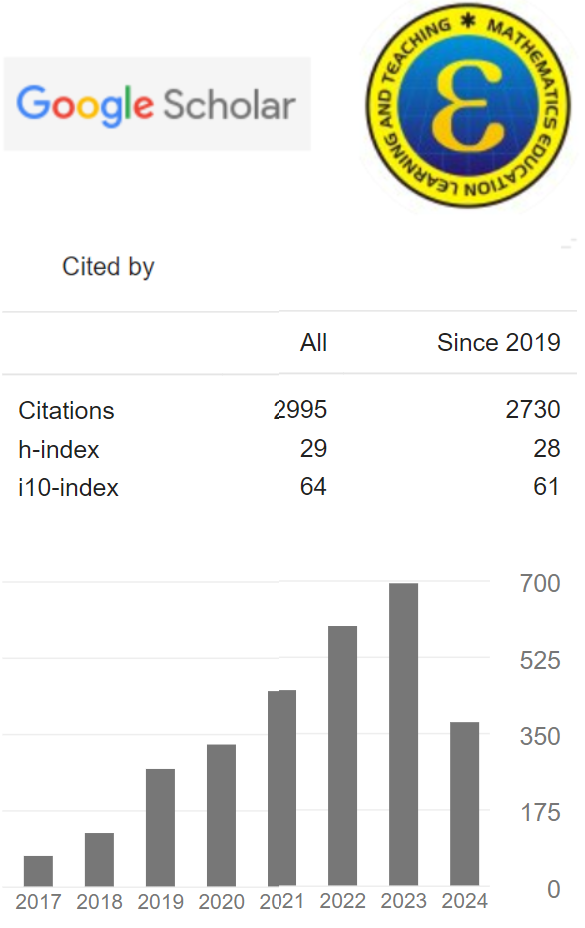MATHEMATICAL CRITICAL THINKING ABILITY REVIEWED FROM SELF-EFFICACY IN DISCOVERY LEARNING
(1) SD Negeri 1 Sokanagera
(2)
(*) Corresponding Author
Abstract
Critical thinking skills are needed as competitive capital in the future. Critical thinking ability is the most important goal taught in mathematics learning. One of the supporting factors for students' success in mathematical critical thinking is the level of self-efficacy. This study aims to determine whether there is an increase in mathematical critical thinking skills in terms of self-efficacy in discovery learning learning. The research design used is mastered experiments using quantitative data. The population of this study was class VII Cirebon 8 Public Middle School and the sample taken was class VII B. The results showed that (1) self-efficacy students'had an average of 78.14 which was quite good. (2) Mathematical critical thinking skills of students have increased based on the results of pre-tests and p-test. (3) There is an increase in students 'critical thinking skills after learning which is viewed from self-efficacy students'.
Keywords: Mathematical critical thinking ability, self-efficacy
Full Text:
PDFReferences
Aditomo, A. 2019. Pedagogical Beliefs about Critical Thinking among Indonesian Mathematics Pre-service Teachers. International Journal of Instruction, 12(1).
Bong, M., & Skaalvik, E. M. 2003. Academic self-concept and self-efficacy: How different are they really?. Educational psychology review, 15(1), 1-40.
Cervone, D. & Lawrence A. P. 2012. Kepribadian: Teori dan Penelitian. Penerjemah: Aliya Tusyani, dkk. Jakarta: Salemba Humanika
Erwanto, E., Maryatmi, A. S., & Budiyanto, A. 2018. The Effects of Reciprocal Teaching Learning Strategy and Self efficacy on Learning Outcomes of Early Childhood (AUD) Mathematical Logic. Al-Jabar: Jurnal Pendidikan Matematika, 9(1), 41-50.
Fakhriyah, F. 2014. Penerapan Problem Based Learning dalam Upaya Mengembangkan Kemampuan Berpikir Kritis Mahasiswa. Jurnal Pendidikan IPA Indonesia, 3(1)
Feist, J., & Feist, G. J. 2010. Teori kepribadian. Jakarta: Salemba Humanika.
Gani, A. 2015. Pengaruh Model Pembelajaran dan Persepsi tentang Matematika terhadap Minat dan Hasil Belajar Matematika Siswa SMP Negeri di Kecamatan Salomekko Kabupaten Bone. Jurnal Daya Matematis, 3(3), 337-343.
Hardiyanto, W., & Santoso, R. H. 2018. Efektivitas PBL setting TTW dan TPS ditinjau dari prestasi belajar, berpikir kritis dan self-efficacy siswa. Jurnal Riset Pendidikan Matematika, 5(1), 116-126.
Ikhsan, M., Munzir, S., & Fitria, L. 2017. Kemampuan Berpikir Kritis dan Metakognisi Siswa dalam Menyelesaikan Masalah Matematika melalui Pendekatan Problem Solving. Jurnal Aksioma, 6(2), 234-245.
Kusaeri, K., Aditomo, A., Ridho, A., & Fuad, A. (2018). Socioeconomic Status, Parental Involvement in Learning and Student’Mathematics Achievement in Indonesian Senior High School. Cakrawala Pendidikan Jurnal Ilmiah Pendidikan, 37(3), 333-344.
Novferma, N. 2016. Analisis kesulitan dan self-efficacy siswa SMP dalam pemecahan masalah matematika berbentuk soal cerita. Jurnal Riset Pendidikan Matematika, 3(1), 76-87.
Nugraha, T., & Mahmudi, A. 2015. Keefektifan pembelajaran berbasis masalah dan problem posing ditinjau dari kemampuan berpikir logis dan kritis. Jurnal Riset Pendidikan Matematika, 2(1), 107 - 120
Pariasa, I. K., Arini, N. W., & Japa, I. G. N. 2015. Pengaruh Pendekatan Masalah Terbuka (open-ended) terhadap Hasil belajar Matematika Siswa Kelas V SD Gugus VII Kec. Tejakula, kab. Buleleng tahun pelajaran 2013/2014. MIMBAR PGSD Undiksha, 3(1).
Piawa, C. Y. 2010. Building a test to assess creative and critical thinking simultaneously. Procedia-Social and Behavioral Sciences, 2(2), 551-559
Sugiyono. 2007. Metode Penelitian Pendidikan Pendekatan Kuantitatif, Kualitatif, dan R&D. Bandung: Alfabeta
Zimmerman, B. J. 2000. Self-efficacy: An essential motive to learn. Contemporary educational psychology, 25(1), 82-91.
DOI: 10.24235/eduma.v8i1.4593
Article Metrics
Abstract view : 241 timesPDF - 116 times
Refbacks
- There are currently no refbacks.
Copyright (c) 2022 Eduma : Mathematics Education Learning and Teaching


.png)










